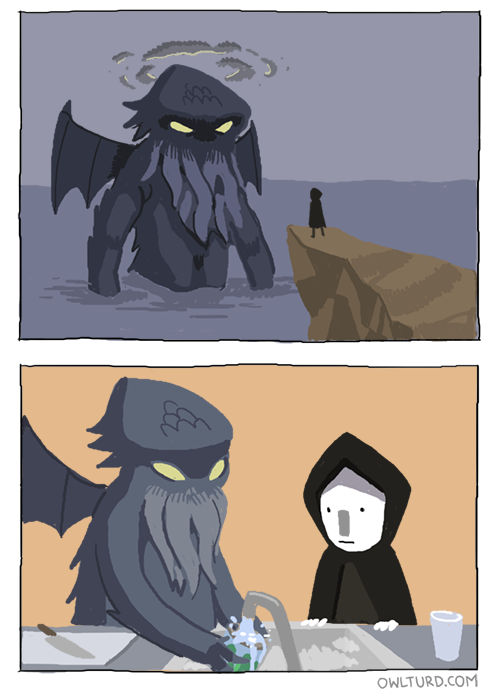Cooper Griggs
Shared posts
Artist Aganetha Dyck Collaborates with Bees to Create Sculptures Wrapped in Honeycomb
Cooper GriggsShared for all you bee people on here.

Photo by William Eakin

Photos by William Eakin
In North America, Europe and many other parts of the world, bee populations have plummeted 30-50% due to colony collapse disorder, a fact not lost on artist Aganetha Dyck who for years has been working with the industrious insects to create delicate sculptures using porcelain figurines, shoes, sports equipment, and other objects left in specially designed apiaries. As the weeks and months pass the ordinary objects are slowly transformed with the bees’ wax honeycomb. It’s almost impossible to look at final pieces without smiling in wonder, imagining the unwitting bees toiling away on a piece of art. And yet it’s our own ignorance of humanity’s connection to bees and nature that Dyck calls into question, two completely different life forms whose fate is inextricably intertwined.












Born in Manitoba in 1937, the Canadian artist has long been interested in inter-species communication and her research has closely examined the the ramifications of honeybees disappearing from Earth. Working with the insects results in completely unexpected forms which can be surprising and even humorous. “They remind us that we and our constructions are temporary in relation to the lifespan of earth and the processes of nature,” comments curator Cathi Charles Wherry. “This raises ideas about our shared vulnerability, while at the same time elevating the ordinariness of our humanity.”
If you want to learn more I suggest watching the video above from the Confederation Centre of the Arts, and if you want to see her work up close Dyck opens an exhibition titled Honeybee Alterations at the Ottawa School of Art on March 3, 2014. A huge thanks to Gibson Gallery as well as Aganetha and Deborah Dyck for their help. All photos courtesy Peter Dyck and William Eakin.
How I Transformed Sewage Into Fresh Water

Say the apocalypse happens tomorrow. The good news: You survive! No more credit card debt or miserable commutes. The bad news? Infrastructure has collapsed and there’s no clean drinking water. Most people can’t last a few days without it, so what we need is a reliable way to purify some from toxic soup.
Distillation covers nearly all bases, freeing H2O of salts, pollutants, microbes, viruses, and other nasties. A common method is moonshine-style, using sealed pots, fire, and complex plumbing. Or it can be done more safely and lazily by harnessing the sun.
Solar stills elegantly miniaturize the cycle that draws water from oceans and lakes, stores it in clouds, and returns it to Earth as rain. I made the one below using caulk and tools from my workshop, plus a windshield, wooden pallets, duct tape, and simple plumbing I salvaged from a nearby Dumpster.
Suspect water goes into a shallow box; the sun shines through the windshield and evaporates the water—leaving behind a stew of contaminants. When the vapor hits the cooler windshield, it condenses back into liquid, trickles into a gutter, and drips into a bucket.
How much did I trust this theory and pile of garbage to purify water? To the death—or at least crippling diarrhea. I started with a filthy sample pulled from the Gowanus Canal, a Superfund cleanup site. An average cupful contains heavy metals, hydrocarbons, and pathogens.
What emerged from the still hours later was clean, clear, and drinkable—no trip to the emergency room required.
Instructions:
Build your still by following these instructions closely, and then use different parts as needed—the list isn’t strict. Most substitutions should work as long as you honor the essence of what each part needs to do. The glass should allow sunlight to enter and water to condense, so a windowpane or a coffee-table top could suffice. The body, meanwhile, needs to be watertight; for example, a stainless-steel sink might work.
Materials:
• Windshield (cracks are okay, holes are not)
• ½-inch-thick plywood scrap (larger than the windshield)
• Two hardwood pallets
• A dozen 1-inch-long wood screws
• Wood glue
• Silicone caulk (black will hold the heat and extend the evaporation period)
• Copper pipe, ½- to 1-inch diameter (at least a couple of inches longer than the windshield is wide)
• About 5 feet of garden hose
• Faucet (you need its valve, not aesthetic qualities; a ball valve could work, too)
• Aluminum foil–lined duct tape (the kind actually used in duct repair, although regular duct tape will work if it’s rated to withstand direct sunlight and temperatures of 160°F)
Tools:
• Jigsaw
• Screwdriver
• Caulk gun
• Metal shears
• Pliers
• Box cutter
• Hole saw (the diameter needs to be the same as the copper pipe’s)
Steps:
1. Outline. Trace the windshield’s shape on the plywood, and saw it out.
2. Frame. Pry off enough pallet slats to make a wall on top of the plywood. They will form a basin and support the windshield; note that a wide, shallow still is a more efficient than a tall, deep one. (Incidentally, one pallet slat’s width is the perfect height.)
3. Body. On one face of the plywood, screw and glue pallet slats all the way around the edge into a tight-fitting border.
4. Basin. Apply caulk to the inside of the plywood and pallet slats, ensuring all surfaces and joints are sealed. You want the inside of the still to be a waterproof basin. (I found that scraps of wood and paper made light work of spreading a uniform layer of caulk.)
5. Gutter. The gutter will run inside the still (along a longer wall of its basin), collect condensed vapor dripping off the windshield, and drain the fresh water through a hole in the basin’s wall. Start by sawing the copper pipe to fit a long edge of the windshield, plus a couple of inches extra (the extra will poke through the wall). Measure the pipe against the longer basin wall, and mark the pipe where it will pass through. Snip the pipe down its length with the shears, stopping at the wall mark. Saw halfway through the pipe perpendicular to the slit you just made and not across it (the cut should stop at the slit). Use the box cutter to score the length of the pipe opposite the slit, stopping at the rounded end of the pipe. Using the pliers, bend the flap you just created all along the length of the score. What remains should be an open trough of copper with a flap down its length and one rounded, un-slit end. Use two extra pallet slats to hammer the flap into a flat lip.
6. Drain. Drill a copper pipe–sized hole through one of the short sides of the caulked basin, near the top of the wall. Poke the rounded end of the pipe into the hole, and set the flat lip of the pipe along the top of the longer basin wall.
7. Faucet. Opposite the gutter wall, drill a hole about a half inch from the top of the still. Jam the faucet into the hole so that the business end of the faucet is pointing up, and the pipe end extends into the still. Foul water will get poured through the open faucet into the basin.
8. Glass. Lay the windshield on top of the basin. Use duct tape to hold it in place, and seal any gaps between the glass and basin with caulk, then with a layer of tape on top, and then more caulk. This seal is very, very important, so take your time and make sure nothing can leak out between the glass and the wall.
9. Hose. Run scrap hose from the protruding copper pipe, down a slight slope, and into a clean collection vessel of your choice. Seal the connections between the pipe, the hose, and the collector with duct tape.
10. Sealant. Caulk every nook and cranny, and allow at least a full day to cure. The whole assembly needs to be vapor-tight or it will not work. A simple test for vapor-tightness: Close the faucet, and blow as hard as you can into the copper pipe. Can you blow freely without much resistance? Then the still is leaky; lay more caulk, let it cure, and try again. Does blowing get harder and have you seeing little black spots dancing in your field of vision? The bad news: You’ve killed some brain cells. The good news: Your still is ready to use.
Directions:
Set the still in the most direct sunlight possible. Open the faucet and pour in suspect water until it’s a couple of inches deep, then close it back up. The still should be slightly inclined, with the gutter at the lower end to move condensation toward it. (An extra pallet slat or two should be enough to prop up the end with the faucet.)
After a half hour or so—more if it’s a cold day or the sun isn’t too bright—water will visibly condense and run down the glass, drip into the gutter, and into the collection vessel. Discard the first few ounces of water. This is especially important if your source was contaminated with lighter-than-water volatiles, such as gasoline and acetone, because these will come off first.
Leave the still out all day. It should continue to work after sunlight fades, as the stored heat does the last bits of work. Then bask in the fact that the most basic of human needs has been mastered.
WARNING: Solar stills can’t remove all organic solvents, and improper use can introduce contaminants. If you build and drink from one—including this version—you do so entirely at your own risk. (Consider waiting until after the apocalypse to take a swig.)
This article originally appeared in the February 2014 issue of Popular Science.
Burlingame House by Tobylongdesign


arquitectr.com/burlingame-house-by-tobylongdesign/
Free Magic Giveaway – Win Your Very Own Foldable Cardboard Buddy.
VectorStock Giveaway – Download 100′s of Amazing Vector Images, Illustrations, Icons, Logos and Clip Art.
A Great Combination of Free Online Tools for Web Designers.
Hot Pockets Recall
Cooper GriggsYIKES!
had to share this particularly groan-worthy pun for a music...
Cooper Griggshehe

had to share this particularly groan-worthy pun for a music event on campus.
took me a minute.
*grooooaaaan*
Make your own clothes with this open source printer
 Store-bought clothing can be expensive, but not everyone has the talent or patience to make their own attire. That may not be an issue if OpenKnit takes off, though. The open source platform combines an affordable (under $757), build-it-yourself...
Store-bought clothing can be expensive, but not everyone has the talent or patience to make their own attire. That may not be an issue if OpenKnit takes off, though. The open source platform combines an affordable (under $757), build-it-yourself...
Invading Switzerland? Try after 5 PM or before 8 AM
 (Photo: Ralf Manteufel)
(Photo: Ralf Manteufel)
Hitler considered invading Switzerland during World War II. But although the little confederation was surrounded by the Axis, it was fully prepared to fight. Germany decided that taking on the Swiss was too dangerous.
It has been a while since Switzerland faced a direct threat to its borders, so perhaps its national defenses have gotten a bit lax.
On Monday, the co-pilot of an Ethiopian Airlines flight bound for Rome hijacked his own plane and flew it to Geneva. He asked Swiss authorities for political asylum. The Swiss government instead plans to prosecute him.
During the hijacking, French and Italian fighter aircraft watched over the plane. But the Swiss Air Force did not because the hijacking took place outside of its normal office hours. Bloomberg News reports:
“You have a budget and you have to prioritize,” said Swiss Air Force spokesman Juerg Nussbaum. While Switzerland monitors airspace around the clock, intervention only occurs during routine business hours starting at 8 a.m., he said.
-via Marilyn Terrell
darning-socks: My morning routine.
15 Brilliant Shower Ideas [mashable]Previously: Crazy Ideas That...
02.19.2014
Cooper GriggsBut then after that is the FLYING level! WOOHOO!

Copy this into your blog, website, etc.
...or into a forum
[IMG]http://www.flashasylum.com/db/files/Comics/Kris/next.png[/IMG][/URL]
Cyanide & Happiness @ [URL="http://explosm.net/"]Explosm.net[/URL]
The man burns in 192 days.

The man burns in 192 days.
How To Tie A Tie

And a happy birthday goes out to Gail today. Hope you have a great day, Gail!
Here are more useful instructions.
Jimmy Fallon Collects on a Number of $100 Bets in Debut Episode of ‘The Tonight Show Starring Jimmy Fallon’
Last night on the debut episode of The Tonight Show Starring Jimmy Fallon, the host Jimmy Fallon decided to call in a $100 bet made with a friend of his that said he’d never be the host of The Tonight Show. As it turns out, Fallon had a similar bet with a number of different friends, including but not limited to Robert De Niro, Kim Kardashian, Joan Rivers, and even Lady Gaga, and they all paid a visit to the set to cough up the dough.
Sophisticated malware finally discovered after 7 years, likely created by a nation-state
 Security firm Kaspersky Labs recently released a research paper that uncovers the existence of a piece of highly complex malware that's been in circulation for almost seven years. It's called "The Mask," which is a rough English translation of...
Security firm Kaspersky Labs recently released a research paper that uncovers the existence of a piece of highly complex malware that's been in circulation for almost seven years. It's called "The Mask," which is a rough English translation of...
"are you on the clock?"
Cooper Griggslessons of life. My friend, she is shmart.
when i was just a starting out, i had an entry-level gig at a big IT company where i interacted with both sales and engineers.
one day i’m at lunch in the break room and a sales guy comes up to me to ask for something. i tell him i’m at lunch, but that i’ll get on it when i’m back at my desk.
later that afternoon the VP of my area comes over to ask if I’d told a sales guy that i was at lunch when he asked for something. i said yes and pointed out that the thing wasn’t time critical and that i’d taken care of it when i got back.
he said that didn’t matter. he said that i should have taken care of it right then.
bewildered, thinking i must be misunderstanding him i asked, “you mean, if i’m at lunch and someone comes in and interrupts me i’m supposed to stop eating and go back to work?”
to which he said “yes”.
from that day forward i always left the building to eat my lunch.
so now, years later, i’m in charge. there are about 20 folks in my line of reporting. and you know what i do when i see them around at lunch time?
i ask “are you on the clock?”
if they say yes, i continue. if they so no, then i say “ok, let me know when you’re back on.”
there is no clock of course. we don’t punch in or anything. but the spirit of it is the same to me.
if you’re on a break, you’re effectively not here - even if you’re standing in front of me.
many folks who work for me and with me say i’m a good manager. i’m proud of that.
and one of the reasons i’m a good manager is because i remember not being a manager.
i remember the shitty things that managers did to me.
and the secret to my success is, in part, trying - every day - to never do any of those things.
never forget where you came from.
assholemermaid: buffy-the-pipe-slayer: vigilantespanties: Fred...










Fred Rogers Acceptance Speech - 1997
I need to get off the fucking internet today.
I swear to god this makes me cry every time I see it
Good morning! Reflections on a rocket launch. Florida photo by...

Good morning! Reflections on a rocket launch. Florida photo by James Vernacotola.
Police Blotter Item Of The Day
Giant Suspended Net Installations by Janet Echelman







In the late 1990s artist Janet Echelman traveled to India as a Fulbright Scholar with the intention of giving painting exhibitions around the country. She shipped her painting supplies ahead of time and landed in the fishing village of Mahabalipuram to begin her exhibitions with one major hitch: the painting supplies never arrived. While walking through the village Echelman was struck by the quality and variety of nets used by the local fisherman and questioned what it might look like if such nets were hung and illuminated in the air. Could it be a new approach to sculpture? A new chapter in her artist career was born, and the artist has since dedicated her time and energy to creating these massive net sculptures in locations around the world.
Echelman is currently embarking on her largest piece ever, a 700-foot-long sculpture that will be suspended over Vancouver next month in conjunction with the 30th anniversary of the TED Conference. In collaboration with the Burrard Arts Foundation, she’s currently seeking funding via Kickstarter to make it happen. There’s all kinds of great prints, postcards, and shirts available so check it out.































